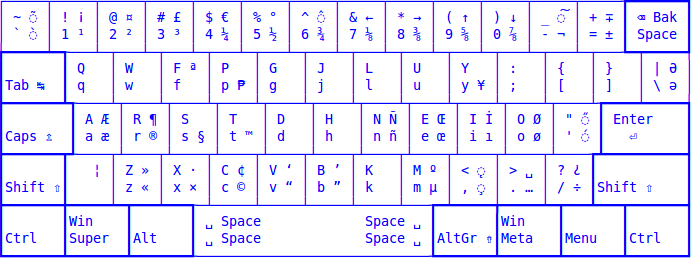
Unicode

The Philippines Unicode & Font test with Barabara font
This test page serves as a place to check a browser’s Unicode and font support for the various Baybayin script variants in the Philippines. There are different test cases to cover as many possible issues that may arise or were encountered.

Unicode 15 and Emoji 15 test page
This is a Unicode and Emoji test page. You can use this to test if your browser can display Unicode characters.

Paleo-Hebrew / Phoenician Unicode Keyboard Layout
The Phoenician Unicode Keyboard Layout or PHNX-UKL is the first Unicode-compliant keyboard layout for the Phoenician Unicode block. Its main feature is the incorporation of the characters commonly used in various ancient Western Asian writing scripts.

Philippines Unicode Keyboard Layout for Windows is out!
I finished the port of the Philippines Unicode Keyboard Layout for Linux to Windows much earlier than I hoped! Rejoice Microsoft® Windows users!
Get it now and start typing all the Filipino characters!

Philippines Unicode Keyboard Layout for Linux is now available!
Today, 23rd of October 2010, Filipino Linux users around the world can now download and use the first release of the Philippines Unicode Keyboard Layout, officially launched during the Philippines Ubuntu 10.10 Maverick Meerkat Release Party.
What is this all about? Simple: being able to type the characters that Filipinos use, especially the ₱eso sign and ᜊᜌ᜔ᜊᜌᜒᜈ᜔ (Baybayin) glyphs that has been available for use since Unicode 3.2 (March 2002). Other characters are: Ññ, ©, ®, ™, ¢, ¥, ¶, Pahilís (acute diacritic), Paiwà (grave diacritic), Pakupyâ (circumflex diacritic), Ng̃ (the shortened form of nan͠g), and many more.
How about Windows users? You will have to wait more or less 2 weeks, it will be usable for Windows 7, Vista, and XP; both 64-bit and 32-bit installations. It is now available for download.
Without further ado, here are the steps to get you started with using our very own Unicode Keyboard Layout.

The YOOki Chronicles is Yohan Yukiya Sese-Cuneta’s return into casual and personal blogging. The name “YOOki” is a mash-up of the acronym of YourOnly.One and my nickname ᜌᜓᜃᜒ (Yuki・雪矢).
Interestingly, according to Chinese legend,
.1柳
(YOO) is an ancient Chinese surname. The ancestors of the surname were closely linked with the ancient sage-king named Yu Shun. In Korea, the 유
(YU) lineage traces to the Xia, Han, and Joseon dynasties. Holders of the surname Yu or Yoo had a reputation for charity and diligence
It is also the word for “willow” or the “willow tree” which means graceful or slender; and a tree growing near a body of water which provide continuous nourishment and resources for everyone. It can also mean to exist, an oil (anointment(?)), and simply as “U” (you).
The Hanzi 紀
(ki) character means to record, be disciplined, provide order. While the Hangeul equivalent, 키
(ki), means energy, spirit, a banner, and a period of time; and is also a suffix used to make a gerund or an infinitive.
